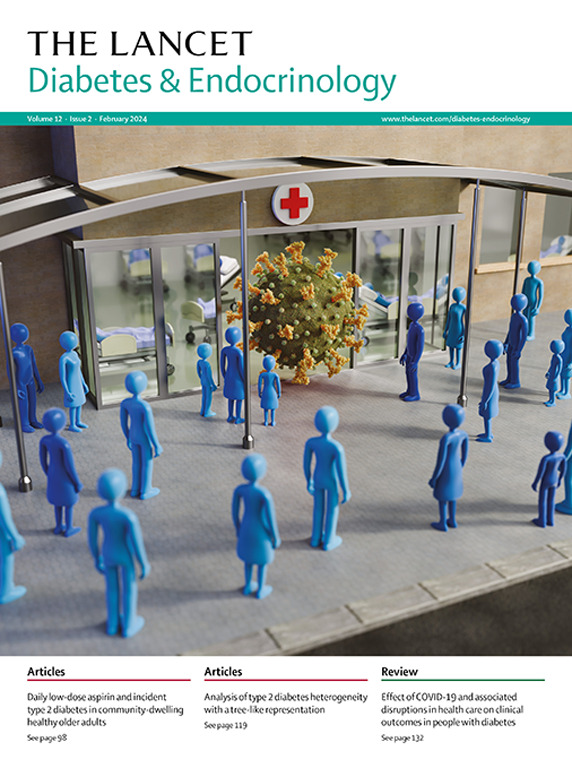Futility of plasmapheresis, insulin in normoglycaemic individuals, or heparin in the treatment of hypertriglyceridaemia-induced acute pancreatitis
IF 44
1区 医学
Q1 ENDOCRINOLOGY & METABOLISM
引用次数: 0
Abstract
There is a well-established link between the severity of hypertriglyceridaemia and acute pancreatitis and long-term triglyceride-lowering therapies known to prevent episodes of acute pancreatitis. Therefore, it has been assumed, without firm evidence, that rapid lowering of plasma triglycerides would be an effective strategy for reducing the clinical severity of acute pancreatitis and improving health outcomes. Therapies, such as intravenous heparin, intravenous insulin in normoglycaemic individuals (with glucose to prevent hypoglycaemia), and plasmapheresis, continue to be widely used as therapeutic interventions to rapidly reduce serum triglyceride concentration. These therapies are all associated with a risk of adverse reactions, require increased resources, and increase health-care costs. Randomised controlled clinical trials of these therapies have generally shown more rapid reductions in plasma triglycerides than conventional supportive care with the patient made nil by mouth. However, these three therapies alone or in combination, have failed to show effectiveness in improving substantial health benefit outcome measures. While we recognise the theoretical basis for rapidly reducing plasma triglycerides in hypertriglyceridaemia-induced pancreatitis—based on our review of studies using heparin, insulin, plasmapheresis, or a combination of these—these strategies overall do not reduce complications associated with acute pancreatitis or the rapidity of disease resolution. Therefore, we do not advocate the use of triglyceride-lowering therapies at this time, pending more convincing evidence.血浆置换、正常血糖个体胰岛素或肝素治疗高甘油三酯血症引起的急性胰腺炎无效
高甘油三酯血症的严重程度与急性胰腺炎和长期降低甘油三酯治疗预防急性胰腺炎发作之间有明确的联系。因此,在没有确凿证据的情况下,人们一直认为快速降低血浆甘油三酯是降低急性胰腺炎临床严重程度和改善健康结果的有效策略。治疗,如静脉注射肝素,正常血糖个体静脉注射胰岛素(用葡萄糖预防低血糖)和血浆置换,继续被广泛用作快速降低血清甘油三酯浓度的治疗干预措施。这些疗法都与不良反应的风险有关,需要更多的资源,并增加卫生保健费用。这些疗法的随机对照临床试验普遍显示,与口服零剂量的传统支持治疗相比,血浆甘油三酯的降低速度更快。然而,这三种疗法单独或联合使用,未能显示出在改善实质性健康益处结果指标方面的有效性。虽然我们认识到快速降低高甘油三酯血症引起的胰腺炎患者血浆甘油三酯的理论基础,但基于我们对使用肝素、胰岛素、血浆置换或这些方法联合的研究的回顾,这些策略总体上并没有减少与急性胰腺炎相关的并发症或疾病消退的速度。因此,我们现在不提倡使用降低甘油三酯的疗法,等待更有说服力的证据。
本文章由计算机程序翻译,如有差异,请以英文原文为准。
求助全文
约1分钟内获得全文
求助全文
来源期刊

The Lancet Diabetes & Endocrinology
ENDOCRINOLOGY & METABOLISM-
CiteScore
61.50
自引率
1.60%
发文量
371
期刊介绍:
The Lancet Diabetes & Endocrinology, an independent journal with a global perspective and strong clinical focus, features original clinical research, expert reviews, news, and opinion pieces in each monthly issue. Covering topics like diabetes, obesity, nutrition, and more, the journal provides insights into clinical advances and practice-changing research worldwide. It welcomes original research advocating change or shedding light on clinical practice, as well as informative reviews on related topics, especially those with global health importance and relevance to low-income and middle-income countries. The journal publishes various content types, including Articles, Reviews, Comments, Correspondence, Health Policy, and Personal Views, along with Series and Commissions aiming to drive positive change in clinical practice and health policy in diabetes and endocrinology.
 求助内容:
求助内容: 应助结果提醒方式:
应助结果提醒方式:


